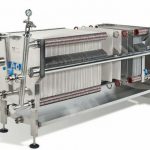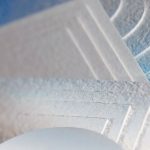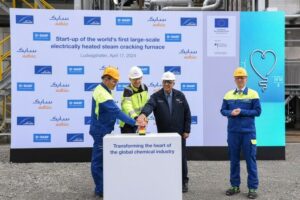Specialist silicones are produced in many different grades at highly integrated manufacturing plants which use multi-stage processes to deliver consistency and repeatability. The manufacturing process is complex and carefully refined: silicates in sand or rock are first processed to obtain silicon. Chemical reactions then produce silanes and, in further steps, polysiloxane precursors, which are the basis for different grades of silicone products.
These precursors contain a silicon-oxygen backbone along with other organics, and they can be processed into end-products such as silicone oils, silicone resins and elastomers. The composition of silicone offers several desired performance characteristics such as thermal and oxidative stability, chemical inertness and excellent dielectric strength.
During the production process which involves hydrolysis of organohalosilane and condensation of chemical compounds forming salts, among other things, silicone manufacturers have to ensure that any unwanted residues and particles are removed, to protect the quality of the finished product. This requirement is met through the use of advanced filtration techniques, which have to be performed without having any adverse impact on volume throughput on the line. Filtration has to be carried out to exacting standards, using equipment that is reliable and easy to maintain.
High demands
One of Europe’s silicone manufacturers came to Eaton with a requirement for a more effective means of carrying out solid separation as well as liquid traces separation at one of its large production plants. The company was producing on a regular basis about 3000 kg (6,614 lbs) of intermediate silicone oil at 5 m3/h (22 gpm). The production process involved a carbonation technique using sodium carbonate to neutralise hydrogen chloride. This process resulted in the generation of water residue and solids, which needs to be removed in an effective way. Failure to do so can increase the viscosity of the final product through the creation of gel in the silicone – identified as a highly undesirable outcome.
Historically, a two-stage process is used. In this process, solids are separated from the silicone intermediate, and water residues are removed using chemical additives. However, the silicone manufacturer wanted to implement a more advanced system that could offer highly controllable removal of solids, traces of water and gel particles in a single-stage operation. By implementing such a unique approach, the company would be able to simplify its production processes, saving time and reducing by-product waste.
Technical realisation
Eaton’s engineers forged a strong customer relationship with the silicone manufacturer, working with its technical team to devise an effective solution. The answer came with the combination of Beco depth filter sheets, fitted to a Beco Compact Plate plate and frame filtration system, allowing for the removal of nearly all water residue and solids through adsorption, without causing any significant pressure drop on the production line.
In laboratory tests with different types of depth filter sheets, an optimised solution was jointly developed. Beco depth filter sheets have a nominal retention rate ranging from 0.1 to 40 µm, and the analyses identified Beco KD 7 depth filter sheet as the most suitable grade for the task at hand. In terms of specific performance characteristics, it has a nominal retention rate of 1.5 µm, making it suitable for filtration of highly deformable particles. The tests showed that the use of 10 m² (108 ft²) of this depth filter sheet could effectively filter about 3000 kg (6,614 lbs) of the initial product with approximately 70 kg (154 lbs) of cake and less than 2% of residual water.
Such a high level of performance was a result of the specific composition of the KD 7 depth filter sheets. This product range is made of pure natural materials and cationic charge carriers. It combines finely fibrillated cellulose fibers from deciduous and coniferous trees with precisely dosed quantities of high-quality diatomaceous earth. A key property of the cellulose fibers is the water absorption capability. In addition, the ideal pore structure of the depth filter sheet allows a reliable retention of gel particles. This enables the KD 7 depth filter sheet to provide the optimal ratio of performance and throughput.
The depth filter sheets need to be inserted in a reliable filtration system. After assessing available options, the company selected the Compact Plate A600 system. This particularly high-class multi-sheet filter system comes with either an electrically or pneumatically operated hydraulic system. Quality was an important consideration for the silicone company. The company wanted a reliable filter system that would not cause any unnecessary downtime. This requirement was met through the use of a solid chassis design, with robust filter frames, that ensure that the hydraulic pressure is effectively directed onto the depth filter sheets. The components of the system are designed to withstand maximum operating temperatures of 121 °C (249.8 °F), ensuring reliable perfor-mance even during extended periods and at high temperatures. The silicone manufacturer also needed a solution that was flexible enough to fit within the restricted space parameters of its production line. The Compact Plate A600 filtration system met this requirement, too, offering a highly flexible filter area from 0.66 to 69.30 m² (7.10 to 745.94 ft²), which allows for customisable solutions for individual applications.
Ease-of-maintenance was also placed high on the specification list. An automatic
re-tightening function monitors the actual tightening pressure during operation, because once the depth filter sheets become wet, their thickness deviates, so the system needs to re-press to ensure leak-tight performance. The Compact Plate A600 filtration system can detect changes immediately and automatically adjusts the hydraulic pressure if it falls below a threshold value. Meanwhile, ease of handling and excellent cleanability is achieved thanks to ergonomic design and use of smooth surfaces. At the same time, a wide range of accessories such as fittings and riser pipes meant the system was ready for quick and secure connection.
Production efficiency enhanced
With the combination of the KD 7 depth filter sheets and the Compact Plate A600 multi-sheet filter system solids, water residues and gel particles can be reliably removed in a much shorter space of time than was previously achievable with the two-stage process. For Eaton, the project represented a highly successful collaboration. The laboratory screening tests showed that the KD 7 depth filter sheets offered just the right level of filtration, meaning that effective removal of water residues and solids could be achieved at specific volume and flow rates. Meanwhile, the flexibility of the Compact Plate system meant that the size of the frames could be adapted to meet the specified dimensions of the production line.
Looking to the future, Eaton believes that the specific properties of the KD 7 depth filter sheet mean it is sure to find further application in the silicone manufacturing industry.
Online search: Eaton
Hall 12.0, Booth D22








